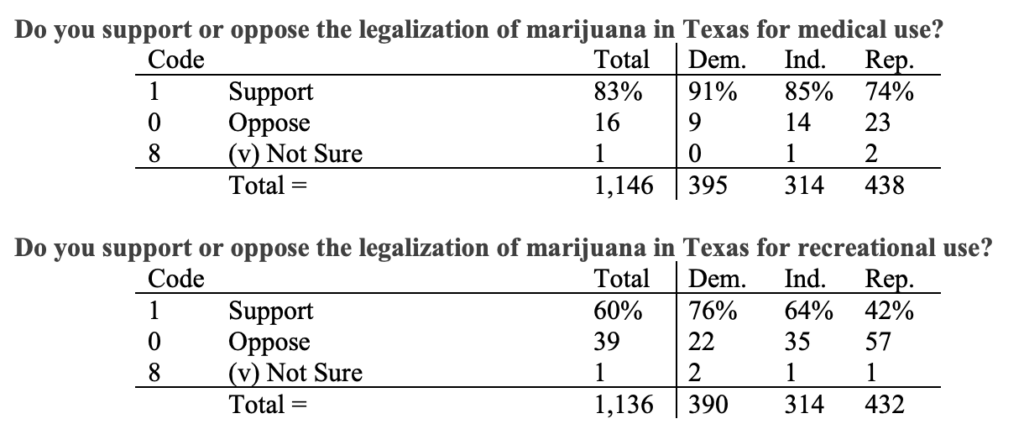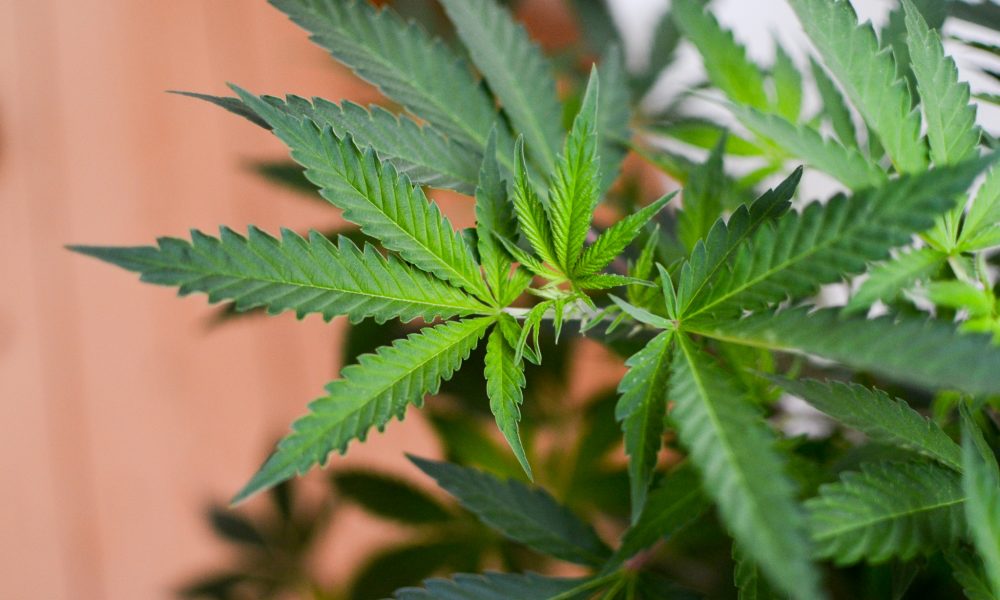Marijuana legalization is more popular in Texas than the state’s top elected officials and President Joe Biden, according to a new poll.
The survey from the University of Texas at Tyler found that an overwhelmingly, bipartisan majority of Texans (83 percent) support medical cannabis legalization, and 60 percent said they’re in favor of recreational legalization as well.
Support for medical marijuana reform crossed political lines, with 91 percent of Democrats, 74 percent of Republicans and 85 percent of independents saying that patients should have legal access to cannabis.

Via UTT.
With respect to adult-use legalization, 76 percent of Democrats, 42 percent of Republicans and 64 percent of independents said they back the policy change.
The survey, which was released ahead of the state’s May 24 primary runoff elections, also asked residents about various political issues and their opinion of election officials and candidates. And the results demonstrate how marijuana reform is uniquely popular among adults in the Lone Star state.
Both medical and recreational cannabis legalization are more popular than Gov. Greg Abbott (R) and Lt. Gov. Dan Patrick (R), whose approval ratings sit at 46 percent and 40 percent, respectively.
Abbott did sign legislation into law last year that expanded the state’s medical marijuana program, and he’s expressed support for decriminalization. But the governor remains opposed to broader reform.
Patrick, for his part, has proactively worked to defeat cannabis measures in the legislature as the Senate’s presiding officer.
The new poll—which involved interviews with 1,232 registered voters from May 2-10—also found that support for legalization is significantly stronger than the approval ratings for President Joe Biden (39 percent), Vice President Kamala Harris (37 percent), Republican state Attorney General Ken Paxton (42 percent) and the state’s two GOP U.S. senators, John Cornyn (33 percent) and Ted Cruz (44 percent).
The issue also enjoys more popularity compared to Democratic gubernatorial candidate Beto O’Rourke, whose favorability stands at 42 percent. O’Rourke does support comprehensive marijuana reform and has campaigned on ending cannabis criminalization.
Approval of immigration and border policies from the president and Abbott are also lower than support for legalization. Additionally, legalizing marijuana is more popular than local law enforcement, the National Rifle Association the advocacy group Black Lives Matter and the idea of erecting a wall along the Texas-Mexico border.
“Polling continues to show that Texans want a change to the status quo,” Jax James, executive director for Texas NORML, told Marijuana Moment. “Bipartisan support for robust medical access and a regulated adult-use market is overwhelming. It is time for legislators to do the work of implementing the voters’ wishes in the 2023 legislative session.”
Another indicator of support for cannabis reform has played out in local elections in Texas. For example, voters in Austin approved a marijuana decriminalization initiative at the ballot this month, with 85 percent backing the policy change.
While Austin, as well as other Texas cities like Dallas, have already independently enacted law enforcement policy changes aimed at reducing arrests for cannabis-related offenses by issuing citations and summons, the ordinance goes a step further.
The measure prevents arrests and citations for misdemeanor marijuana possession within Texas’s capital city. Also, it says police cannot issue citations for residue or paraphernalia in lieu of a possession charge.
Activists also recently said that they’ve collected enough signatures to place cannabis decriminalization on the November ballot in Denton. Organizers are also working to put marijuana decriminalization on local ballots in Killeen, Harker Heights and San Marcos.
There is no statewide, citizen-led initiative process that would enable advocates to put an issue like marijuana decriminalization or legalization on the Texas ballot. But at the local level, there are limited cases where activists can leverage home rule laws that allow for policy changes.
—
Marijuana Moment is already tracking more than 1,000 cannabis, psychedelics and drug policy bills in state legislatures and Congress this year. Patreon supporters pledging at least $25/month get access to our interactive maps, charts and hearing calendar so they don’t miss any developments.![]()
Learn more about our marijuana bill tracker and become a supporter on Patreon to get access.
—
A separate poll released late last year found that a strong majority of Texans—including most Republicans—support adult-use marijuana legalization.
Drug policy reform did advance in the legislature during last year’s legislative session, but not necessarily at the pace that advocates had hoped to see.
Beside enacting medical cannabis expansion, another bill went into law to require a study into the therapeutic potential of certain psychedelics for military veterans were enacted.
Advocates remain disappointed, however, that lawmakers were unable to pass more expansive cannabis bills—including a decriminalization proposal that cleared the House but saw no action in the Senate.
The House approved a cannabis decriminalization bill in 2019, but it did not advance in the Senate that session.
The Texas Republican Party adopted a platform plank endorsing decriminalization of marijuana possession in 2018.
A Texas poll that was released over the summer found that 60 percent of voters in the state support making cannabis legal “for any use.”
Separately, the state Supreme Court heard testimony in March in a case concerning the state’s ban on manufacturing smokable hemp products—the latest development in a drawn-out legal battle on the policy first proposed and challenged in 2020.
U.S. Senator Mocks Home State’s Marijuana Law During Abortion Debate
Photo courtesy of Philip Steffan.
Medical Disclaimer:
The information provided in these blog posts is intended for general informational and educational purposes only. It is not a substitute for professional medical advice, diagnosis, or treatment. Always seek the advice of your physician or other qualified healthcare provider with any questions you may have regarding a medical condition. The use of any information provided in these blog posts is solely at your own risk. The authors and the website do not recommend or endorse any specific products, treatments, or procedures mentioned. Reliance on any information in these blog posts is solely at your own discretion.







